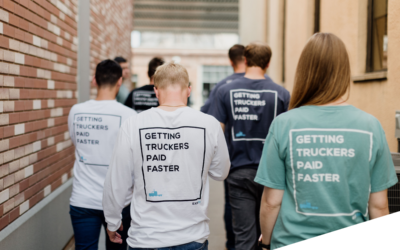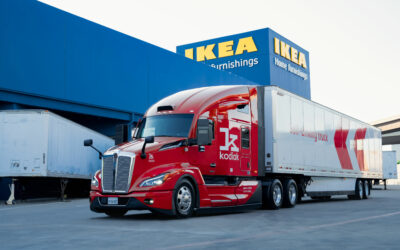Many factors go into starting a new business, especially when starting a trucking company. In today’s world, logistics is a great way to expand your career horizons and reap the rewards of a growing trucking market. After all, disruption promotes increased value in shipping for carriers, and over time the carriers that arise in today’s market will be better positioned to reap the future rewards. But first, there are a few fundamental questions worth asking: how much does it cost to start your trucking company and what requirements to start a trucking company do you need to know?
The exact costs of starting a trucking company vary. As explained by KeepTruckin, “An initial cost you can consider when starting your trucking company is about $6,000 to $15,000 (not including your equipment).
This includes registration and formation documentation that, on average, cost from $900 to $1,500. IRP plates could cost you anywhere between $500 to $3,000 per truck. Heavy Vehicle Use Tax and a permit might cost, on average, $100 to $600 per truck. You might also incur an additional state-specific tax, which would be, on average, $500 per truck.
Drivers might earn 30.3 cents per trucking mile or, on average, about $32,000 a year. According to the U.S. Bureau of Labor Statistics, the median annual wages for all occupations as of May 2017 is $37,690. A clear profit exists for vehicle moving companies as about 4.8 cents is gained per operating dollar spent. However, some drivers may earn more than that.“ Yet, even these costs are not really much of a gauge for how to push a new trucking company toward success. Rather than getting lost in the weeds, here are the top steps to opening a trucking company and seeding success.
1. Write a Business Plan
A business plan for starting a trucking company can clearly show what revenue and expenses will be. This project can provide a roadmap to success and can adapt as the business continues to grow. For an owner, this plan can allow for organization, identifying goals, articulating a value proposition, and presents potential obstacles down the road.
2. Select a Business Structure
Each business structure provides advantages and disadvantages based primarily on liability and taxes and will vary with each state. Having such an arrangement will set boundaries between personal assets and business liabilities. Additionally, it can protect private property as a business owner, incorporating several legal, tax, and business advantages.
Typical structures for a trucking business include:
- Sole proprietorship
- Partnership
- Limited Liability Corporation (LLC)
- Corporation (C-corp, S-corp, etc.)
Additionally, those interested should consider leveraging expert resources, such as RocketLawyer or other legal services, to complete incorporation if selected. This goes a long way toward reducing costs and ensuring everything is addressed at the inception of the business.
3. Fund Your Business to Cover Start-Up Expenses
For people seeking to open a trucking company, starting a trucking business requires a significant investment upfront to purchase the proper trucks and trailers. Additionally, owners must remember the fees for licensing requirements and registration and understand how quickly costs can add up.
To start a trucking business alone will cost thousands of dollars. However, owners also must take into consideration what happens if the company does not receive clients quickly. Some experts recommend having enough money to cover the first six months of operational expenses, including lease payments for equipment. Regardless, this step is the simplest, figuring out your finances and what costs need to be accounted for prior to actual opening.
4. Create and Establish Your Business Through Legal Channels
There’s much more that goes into building a trucking business than simply creating its structure for incorporation or purchasing software for managing the books. Trucking companies must adhere to specific requirements to maintain compliance with all applicable governing bodies. For people wondering how to start a trucking company, the company needs to comply with the following legal filings:
- USDOT Number: The U.S. The Department of Transportation (DOT) requires carriers to have an identifier to collect and monitor safety information.
- Operating Authority: All for-hire carriers must receive operating authority from the DOT. This authority will identify what type of cargo the company will carry.
- Heavy Vehicle Use Tax: To fund highway programs, the federal government charges annual taxes.
- International Registration Plan (IRP): Distributes registration fees based on distance traveled in each state.
- International Fuel Tax Agreement (IFTA): An agreement that simplifies fuel reporting to use by carriers who drive in multiple states.
- BOC-3 Filing: Carriers must have a process agent that receives court papers in a legal proceeding.
- Drug Testing and FMCSA Clearinghouse: Manage the company drug testing program and registering all drivers with the Federal Motor Carrier Safety Administration (FMCSA) Clearinghouse.
Even those requirements do not yet capture the full scope of what’s needed to open and be ready to move freight.
5. File for Local Business Permits or Licensure
While broad registration is essential to starting a trucking business, there may be local laws or regulations governing the launch of such a business. It is important to check with all agencies to ensure you have completed all appropriate tax forms and registration requirements for each area where your company is based. This is essential to avoiding compliance violations or adverse actions that would lead to lost profitability. Further, checking with an attorney is also a core step to ensure your business has met all obligations for such filings and for all areas where you will be operating to avoid such risks.
It may be necessary to provide additional information regarding the type of freight you intend to haul. For example, hauling alcohol comes with local and state-level restrictions that may affect your plans for launch.
6. Obtain Your FMCSA Number
Companies must acquire Federal DOT and Motor Carrier Authority Numbers with the requirements to start a trucking company. The U.S. DOT number allows for company safety records and compliance regulations tracking. The motor carrier (MC) number, also known as an operating authority, identifies the trucking business operating and the goods permitted to haul. Business owners acquire these numbers through the FMCSA.
To receive FMCSA numbers, owners must fill out a Safety Certification Application and Motor Carrier Identification Report (MCS-150). After receiving the numbers, the FMCSA must review the forms and conduct a “mandated dispute period” in which the application posts on the Federal Register for ten days. Those ten days allow anyone in public to comment on any issues with your application for authority.
7. Create Your Business Back-Office Structure
Having time for paperwork and contacting customers for payment is essential for people questioning how to start your own trucking company. Having a partner that can assist with billing paperwork and collections streamlines this process to allow you to spend more time focusing on operations. Many companies use a digital program to enable seamless and efficient management to make the payment process easier for customers and owners.
Utilizing technology in the trucking industry can simplify communication for load documents and same-day payments. Having access to an app can provide an easy-to-use scan-and-send system for documentation at a low rate and can effectively make payday come even quicker for your team. Additionally, it’s a wise move to select a customer relationship management CRM) software and get on the road toward building your book of business.
8. Select Your Equipment
The proper equipment can significantly differentiate between success and failure when understanding how to start your trucking company. This time spent deciding whether to buy or lease equipment provides an opportunity to conduct additional research and leverage network connections. When deciding on equipment for a trucking company, ask yourself, can the vehicle accommodate the needs of the cargo and can it help provide the best means of action?
If not, additional equipment may be necessary, opening the door to new types of financing for such equipment. For reference, standard leasing options include:
-
- Operating (Full-Service) Lease: In this circumstance, you will take care of maintenance, taxes, and permits to the end of the lease term.
- Terminal Rental Adjustment Clause (TRAC) Lease: In the beginning, the company will require a small down payment and can purchase the truck for the residual value at the end of the lease.
- Lease-Purchase Plans: These plans primarily assist truckers who do not have enough for a down payment or have bad credit. However, this option can cost more than traditional financing.
9. Get Adequate Insurance Coverage
Any plan for starting a trucking business must include the elephant in the room: insurance. There are also different types of insurance required for transporting freight, including:
- Primary Liability: $750,000 in primary liability is necessary to cover damage or injury done in an accident where it is determined the company is at fault. Many shippers or brokers require $1 million in primary liability coverage.
- Cargo: About $100,000 is usually the most common request to cover the load, but it depends on the hauled product. This covers damage to freight and theft.
- Physical Damage: Covers truck damage in accidents; the owner of the company does not have liability.
- Non-Trucking-Use (Bobtail): This can cover the owner’s liability for an accident while not hauling a load for someone else.
- Per-Load Insurance: Cut the annualized costs and quickly cover specialty loads with fast and cost-effective all-risk coverage per shipment through instant quoting platforms.

10. Hire Office Staff and Drivers
Besides having the money for equipment and commodities, support staff and drivers also come into play when starting a trucking business. Running a standard grain hauling business, owners should look toward hiring a logistics manager, truck drivers, accountants, sales and marketing officers, and customer services representatives.
To effectively run a small-scale but standard hauling business, a wide variety of team members are needed for different positions. In some circumstances, you will need to hire laborers to help load and offload trucks, and some experts can provide assistance to handle functions such as servicing, repairing, and maintaining the trucks.
11. Provide Proper Training to Staff and Drivers
Driver education provides the information drivers need to know to do the job correctly and safely. It’s important to design an effective training program that accommodates different learning styles. Think about incorporating pictures, videos, and other forms of multimedia into the training program. Shifting gears in the middle of an education section will help employees to retain important information better.
Especially in the trucking industry, it is impossible to overtrain or over-educate employees on safety. Evaluate the experience and talents of the new employees to get a better understanding of what kind of educational materials each team member needs.
12. Sign up for Free Load Boards and Matching Platforms
Trucking companies often use a load board to find customers and freight; this tool can provide a competitive advantage for new companies. Using a load board can provide more accurate and robust data to provide more information when looking for freight.
Digital freight matching companies, including free load boards, match a shipper’s demands for carrier/trucking capacity commonly through an app. The benefits of using a load board or matching platform include these core points for trucking companies.
- It reduces the amount of time it takes to review potential loads.
- Digital platforms can provide digital messaging and paperwork to ensure documentation is always available.
- It eliminates the process of faxing documents back and forth.
- Load boards have the ability to provide predictive matching to keep carriers loaded with high-paying shipments.
- New trucking industries can get a foot in the door faster and gain clients with ease.
13. Monitor Performance of Your Assets WIth Analytics
Transportation asset management is a strategic approach to managing transportation infrastructure assets. It focuses on the business processes for resource allocation and utilization, which will lead to better decision-making based on quality information about assets and well-defined goals expressed as Levels of Service.
Transportation analytics and visualization capabilities help carriers and trucking companies understand and measure the health of their business. This effectively increases insight into existing operations to understand where things are going right or wrong, avoiding profit losses and maintaining performance.
14. Find High-Quality Loads Through Networking Partnerships Too
Carriers and start-up trucking businesses can start building relationships with potential customers through marketing and networking efforts. Joining trucking associations such as small trade shows and local groups can provide a good source of leads and networking.
Maintaining a good partnership between a shipper and carrier can allow for networking through the other. If your new business has good communication and builds a partnership with a good reputation, shippers will promote your trucking business to others.
15. Choose the Right ELDs That Will Help You Adhere to HOS Regulations
An Electronic Logging Device (ELD) is electronic hardware that attaches to a commercial motor vehicle engine to record driving Hours of Service (HOS). This device will monitor the vehicle’s engine to obtain data on whether the engine runs, if the vehicle is moving, how many miles have been driven, and the duration of the engine operations. HOS regulations help ensure overall road safety by governing the number of hours truck drivers can drive and work. In general, HOS rules regulate the maximum number of hours operated, specify mandatory break times and off times, and duty cycles. It’s important to thoroughly review any and all of these regulations, as well as the available data.
16. Track Your Income and Expenses
Having a system that can track income and expenses is vital for the logistics of a company. Carriers often receive payments weeks or months after delivery, which can make it difficult to track expenditures. To avoid obstacles when starting a trucking company, keep these tips in mind:
- Online accounting software can help track income and expenses around the clock. A payment app or platform as well can provide easy access to payment documentation and records.
- Fully understanding when and how companies will pay for services, most shipping contracts provide for 30-90 days after delivery. Take delays and other issues into consideration as well.
- Keep files of invoices, receipts, and check stubs, in case you have to review the numbers. This also includes ensuring your team is able to keep personal and business finances separate.
17. Maintain Compliance With Renewals and Applicable Certifications or Licensure
Regarding how to open your own trucking business, owners must understand the importance of staying up to date on the time-sensitive filing requirements, ranging from IFTA’s quarterly tax returns to multi-year renewals for CDLs. Failure to keep up with these requirements can result in loss of good standing or significant penalties.
Companies must also stay compliant with state corporate reporting requirements; if they cannot, the state will revoke the corporation’s or LLC’s existence. Companies must ensure the renewal documents are completed and filed on time without irregularities and discrepancies.
18. Choose All Platforms Based on Ease of Use and Transparency
Cloud-based systems and platforms can provide real-time transportation technology for any organization at a fraction of the cost of building an in-house system. This can also provide your team live updates and easy-to-use options for managing freight, like an app to have information always on hand constantly.
Some systems may come with hidden fees, and others can cause companies to have a negative outlook on platforms. Regardless, look for transparency and ease of use when selecting these resources. Ultimately, they should be reliable tools to help organize, streamline, and manage daily operations while receiving payment sooner rather than later.
19. Avoid Costly Freight Finance Solutions
Another factor to consider when contemplating how to open a trucking company is how you will finance freight. People who want to start a trucking business may fear the different factoring services or traditional finance solutions that tend to be costly. Choosing to work with an expensive financial solution will not only add expenses but may leave you unable to maintain a steady cash flow.
Factoring for trucking can provide a debt-free working capital solution designed around the concept of preventing a strain on trucking finances. Freight factoring eliminates the waste period on payments and ensures invoices are challenged if applicable, submitted, and converted to working capital in a day.
20. Leverage Freight Factoring to Shorten the Payment Clock
Anyone wondering how to start a trucking company should understand the efficiency freight factoring can provide in shortening the payment period. Rather than having to wait for payment, keeping your cash flow at the mercy of shippers, there’s another option. By using a digital service, the invoice can be submitted to a factoring service provider to complete payment in advance. In turn, this provides immediate access to cash without impacting the shipper’s typical payment schedule. And since you can turn the freight bill of lading or invoice into a factoring company that will pay you right away in exchange for a service fee, you’re better able to take more loads, complete more hauls, and keep everything moving along. This can benefit a start-up business immensely in the beginning and continue to provide benefits as the company grows.
The main benefit of freight factoring revolves around same-day pay and shortening the payment clock. This allows for more cash flow and operating capital for small or start-up businesses and can qualify a broker to assist with credit checks. For trucking companies, big or small freight invoice factoring can allow outsourcing accounting functions and collections, ensure steady cash flow, and streamline business operations.
The Right Steps to Success Follow Efficiency and Improved Backoffice Processes
For a trucking company that’s about to launch, knowing the right steps to success can make or break the business’s profitability and lead to opportunities for growth. All individuals wishing to start a trucking business need to follow the right steps, as listed above, to improve efficiency, guarantee top-notch back-office processes, and have a ready-to-roll tech stack on day one. Fortunately, many of those existing systems and steps are easier implemented with today’s advancements behind cloud-based management and processing.
Start a Successful Trucking Company by Creating Strategic Finance Processes With BasicBlock
With all the information on starting a trucking business and realizing the requirements, having a platform for factoring and payments can provide efficiency and a better starting point. Finding a company that can do everything from capturing documents to invoicing and collecting, all on an efficient app, can be extremely challenging. But it does not have to be. BasicBlock has the solution to help you get started today!







0 Comments